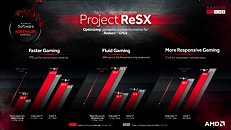- Joined
- Oct 9, 2007
- Messages
- 47,233 (7.55/day)
- Location
- Hyderabad, India
| System Name | RBMK-1000 |
|---|---|
| Processor | AMD Ryzen 7 5700G |
| Motherboard | ASUS ROG Strix B450-E Gaming |
| Cooling | DeepCool Gammax L240 V2 |
| Memory | 2x 8GB G.Skill Sniper X |
| Video Card(s) | Palit GeForce RTX 2080 SUPER GameRock |
| Storage | Western Digital Black NVMe 512GB |
| Display(s) | BenQ 1440p 60 Hz 27-inch |
| Case | Corsair Carbide 100R |
| Audio Device(s) | ASUS SupremeFX S1220A |
| Power Supply | Cooler Master MWE Gold 650W |
| Mouse | ASUS ROG Strix Impact |
| Keyboard | Gamdias Hermes E2 |
| Software | Windows 11 Pro |
AMD's late-Monday release of the Radeon Software Adrenalin 18.3.1 has a big change not chronicled in its change-log, the first implementation of ReSX. Short for "Radeon eSports Experience," ReSX is the code-name of a major effort within the Radeon Software team to address some of the fundamental complaints competitive eSports gamers had been having with Radeon GPUs - click-to-response and frame-time. As an eSports gamer chasing a million-dollar price-pool, you'd want your graphics hardware to have the least frame-time (the most fluid output), the highest frame-rates, and of course the least click-to-response time (the infinitesimal amount it times for a click of your mouse to register as action, be sent to the game-server, and render on-screen, simultaneously.
AMD stated that has approached these problems from two fronts - by working with developers of the biggest eSports titles to optimize their game-engines for Radeon; as well as making under-the-hood changes to Radeon Software. The company is announcing not just marginally higher frame-rates in certain eSports titles, but also significant improvements to frame-time (99th percentile of), and lower click-to-response times. According to the performance numbers put out by AMD, while these improvements may not be double-digit percentage points difference, could still translate into a vastly improved gaming experience, according to AMD.

View at TechPowerUp Main Site
AMD stated that has approached these problems from two fronts - by working with developers of the biggest eSports titles to optimize their game-engines for Radeon; as well as making under-the-hood changes to Radeon Software. The company is announcing not just marginally higher frame-rates in certain eSports titles, but also significant improvements to frame-time (99th percentile of), and lower click-to-response times. According to the performance numbers put out by AMD, while these improvements may not be double-digit percentage points difference, could still translate into a vastly improved gaming experience, according to AMD.

View at TechPowerUp Main Site






